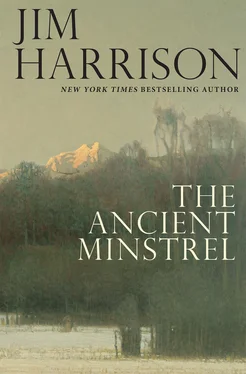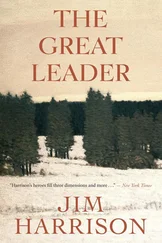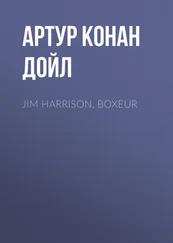Catherine drove Jerry and her mother to the Texan’s landing strip. The Texan had only dropped Jerry off the day before in his new Jeep Wagoneer. No one local would use a six-thousand-dollar vehicle to roam his ranch. Catherine was glad to see them leave, flying east to Rochester, Minnesota, to get her mother admitted to Mayo. Her mother sobbed piteously while boarding the plane because she couldn’t stay to help with the oncoming baby. Help by being a relentless pain in the ass? Catherine thought wryly. You couldn’t miss Jerry’s self-importance in boarding a private jet.
She daily felt heavier and more awkward but was pleased when the baby kicked in her womb. She could barely make her morning stroll with Hud out to the pond and boneyard behind the barn. One day it was cool and rainy and she refused to go and he actually wept until she relented, bundled in a sweater and raincoat. She reminded herself of the perils of starting habits with dogs. In the big pasture they had to go back every time to the rock pile where he had once almost but not quite caught a big black snake. He was obviously goaded by his failure.
Near the pond she sat on a big rock with a peculiar resemblance to a monster stone egg. It had been Catherine’s “magic” place since early childhood. When she frequently visited the farm with her mother she’d walk out to her stone egg when she was disturbed by anything and the stillness of the scene pacified her. How can you draw pure energy from a stone? It was possible for her. Later in life it occurred to her that in the serenity of the place she had arrived at a point of child meditation where her mind emptied itself of its enervating trash and she could identify with the pond and big pile of white cow bones. Now it amused her when Hud tried to pick up the pelvis of a cow skeleton. His jaws weren’t strong enough yet to pick it up but he had slowly dragged it about halfway to his trophy hideout in the front yard lilac grove. Such extreme effort for his own private reasons. Like a child he had his own collection of “stuff” whose importance was clear only to the owner.
She sat there on the stone egg and was flooded with rare sympathy for her mother. Her father’s promise of a farm in Montana was an outrageous lie and it was obvious that he’d never had any intention of keeping that promise. Her grandfather in England told her that her father was a “scoundrel.” Who in his right mind would rather run a tiny bank than be a farmer? This was during a long conversation during the Blitz. Her grandparents had urged their daughter early on to leave the bastard but along came Robert and her. Even his own parents were not that fond of him, preferring the company of Catherine’s mother. She was always absolutely welcome at the farm but it would have been a small town scandal had she moved out there permanently. Now Catherine believed that she should have. What did it really matter if her mother had embraced her singular desire? It was a brutal lesson indeed to both mother and daughter. To live at a distance of a half dozen miles from where your heart was.
As she sat there scratching Hud’s ears which he loved the worry about Tim was nagging at her, this idea that suicides must go to hell. It was maddening to worry about a person already dead and she couldn’t quite believe that God would add to the suffering of someone who had already suffered so much. To her the suicide had been an act of courage. To deny the self further existence when the self had been so rended. War waits to kill some.
She wanted to examine her religious beliefs and discard the ones that no longer made sense but it seemed difficult when she was this pregnant. She also perceived that to discard them wouldn’t be all that easy or simple. They were ingrained. When she was passionately religious as a young girl she read the Gospels over and over. By contrast the Old Testament was mean and foreboding. Why did King David so desire Bathsheba and send her husband away to be killed in battle? That seemed very mean-minded to her and Laura had agreed. And why did this great man peek at Bathsheba while she was bathing? This was definitely a sin she supposed. Even now she said her prayers before bed in the evening though they were quite abbreviated. She kept recalling her disappointment as a girl when she prayed that her parents would quit getting drunk and it hadn’t happened. She still believed devoutly in the Resurrection partly because it was such a glorious, magical idea to rise from the dead with the spike scars in your hands and feet. She knew that a belief in magic was quite common among her friends, even her Sunday school teacher who claimed to have seen several ghosts.
Now to Catherine the magic of life was in the spectacular assortment of species. Even at this moment she saw the nose of a muskrat rise above the surface of the pond. Hud also saw it and sitting beside her quivered with excitement but then he was thinking of a wild meal. She had read that some people ate muskrats from the river in Detroit, Michigan, but then she had also read that poor people in the Southwest ate donkeys during the Depression. Why God had decided not to stop her parents’ drinking was the early question that stuck with her. It seemed a simple request but then that was long before she knew anything about addiction. She herself had been truly drunk only once on her college graduation night and felt badly for three days which prevented her from doing it again. It had competed with the preposterous discomfort of being nearly nine months pregnant. She had read once about a woman who bore eighteen children which now seemed thoroughly incomprehensible even if she had been a cow.
Catherine summoned Clyde one Sunday morning for a somewhat formal meeting on the farm after her walk. She needed him to spend more time around her place in case she fell and delivered the baby on the ground. The obstetrician had warned her to be more cautious about her walking for the time being.
In fact Catherine was finding walking difficult now. Her legs and feet hurt from the extra weight. She thought now that one baby would certainly be enough. She kept recalling how she had ruined walking for a while way back when she was doing the Lorca project in college. The poet had obviously spent a great deal of time walking around the city for Poet in New York and her plan was to imitate the tactic. One morning she started out on 112th Street and walked all the way to Washington Square in the Village where she felt lucky to hear a very good violinist play a Paganini piece that was a little beyond him but not by far. He smiled as spectators filled his open violin case with money. A dapper old man dropped in a twenty and the musician broke into a grin.
Now back at the farm Clyde seemed nervous like all of the poor about a good job. He finally blurted out that when Jerry was here he had stopped by and asked Clyde if he thought he could handle managing the Texan’s ranch in addition to Catherine’s farm. Clyde thought it over briefly and said yes because the Texan’s ranch was a basic cow operation where you turned bulls loose every year and then waited to see how many new calves you got. Of course there were a thousand somewhat complicated details but none that Clyde couldn’t handle.
Catherine felt up in the air about the whole business though she knew it would be good for Clyde making him a big shot manager of a large ranch. The poor are always saying, “I’d like a break that is not my neck.” So she told Clyde she was pleased for him. She couldn’t add that she could barely stand the sight of Jerry. But then she predicted to herself that he wouldn’t be out that often. His sport was buying, not maintaining what he bought. He might go to one Cattlemen’s meeting to strut a bit and that would largely be it. She told Clyde to make sure he kept a good set of books because the rich thrive on the suspicion that they are being swindled.
Читать дальше












